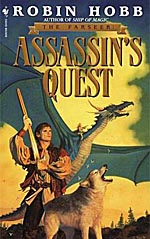
![]() Rabindranauth@DDR
Rabindranauth@DDR
7/27/2014
![]()
I think that one of the inherent dangers of a character driven novel is that sometimes characters can only logically go in one direction, and sometimes it's a direction you don't want them to.
Continuing directly after the end of Royal Assassin, Fitz is in even worse condition than he was at the beginning of the book. Except in this case, he has mental damage. With King Regal's abandoning of the Coastal Duchies to the brutality of the Red Ships, the end has begun for the Six Duchies. Prince Verity is still lost somewhere beyond the Mountain Kingdom, on a quest to seek the Elderling's aid. A quest doomed to fail, as not only does Verity have no knowledge of how to do this, but King Regal intends to see his reign solidified by ending Verity's line once and for all.
What an absolute train wreck of a book. I quickly became so disinterested in unfolding events that it took me forever to finish this. But at the same time, it wasn't so bad I wanted to abandon it. That's more in the vein of splitting hairs than praise for the book itself.
Her excellent writing style really helped me to enjoy parts of this at times, though they were few and far between. The major reason I didn't abandon this, though, was due to how much I enjoyed the previous two novels in this trilogy; I quite frankly wanted to see how it all ends. Robin Hobb has proven that as predictable as I think things are, I should never assume I know exactly what will happens.
In addition to this, after his drastic personality change since the first book, the Fool finally began behaving like his old self at times. On hindsight, moments with him tended to be the parts where I enjoyed the book the most. This really helped to stave off frustration, especially as this occurred in the latter half of the novel, when I was struggling the most with the book.
But as this all clearly proves, no matter how excellent your writing is and no matter how interesting your characters are, if the basic plot of the story isn't interesting, you're not going to be worth the read in the end. Interestingly enough, as much as I disliked this book at the end of it, I can see why Robin Hobb had to write the story she did.
My first big issue was the entire subplot at the beginning, after Fitz recuperates enough to strike out on his own, and heads toward Tradeford. That entire story arc literally served no purpose other than to slap an extra hundred and fifty pages of bloat onto an already large story. But at the same time, I felt it was necessary, as much as I hated having to slog through it. Why?
Fitz, at his heart, has proven the type of character he is. Loyal to a fault, always willing to do whatever has to be done no matter the cost. He's also proven he'll do whatever he wants, regardless of the consequences, despite what every other important character has advised and sometimes ordered him to do. Combined with his mental condition at the start of this book, it was easy to see why he chose to act like that. Actions Robin Hobb clearly felt she had to write. I understand the reasoning behind it, but I definitely didn't enjoy it, and it started me off on a bad foot with the book when events of importance did begin to happen.
But then again, "events of importance" is a highly questionable phrase with which to label the consequences of Fitz's actions and the story that follows. As if the first chunk of the book was not exasperating enough to suffer through, we're treated to a Harrowing Journey storyline for four hundred pages, hot off the press. No amount of excellent, engaging writing can make that particular story new or interesting to me. As in previous books, Fitz undergoes some nasty personal trials along the way, but given the way this book started off and continued, I didn't care. I just wanted to get to the end and find out what happens so I can put myself out of my misery.
And then there's the ending. What an extremely unsatisfactory ending. I don't understand why Robin Hobb chooses to foreshadow events and then have them play out precisely as she predicts, but it happens enough times, with too many details in these books, to do anything more than ultimately wreck the story she's telling. Just another point on the list of things that completely ruined this book for me. Some of the minor revelations, and the additional backstory revealed was interesting, but it wasn't enough to save the entire ending of the trilogy for me.
Overall, this book was a bitterly frustrating conclusion to what previously was an incredibly engrossing story. Robin Hobb is definitely one of the best writers I've ever read, her prose is amazing, but I really don't care for her choices of plot at times, and this book suffered for it. I would recommend reading this only if you cared about the story so far enough that you need to know how it ends. And even then, brace yourself for a slog. Nevertheless, I definitely look forward to her other books; my major issues with this book was her choice of plot, and based on what friends have said of her succeeding books, I don't think I'll run into another case like this again.
http://drunkendragonreviews.wordpress.com/